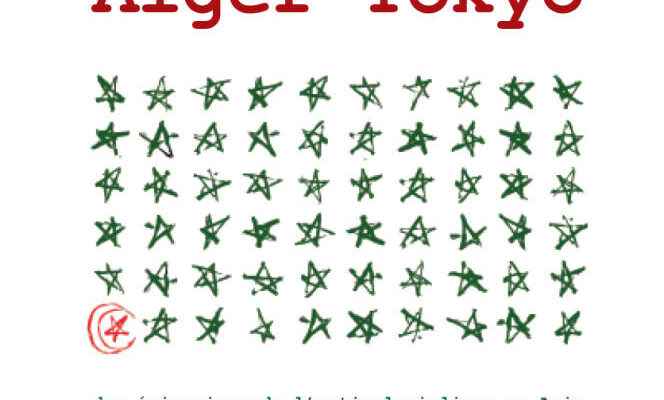In his latest book, titled Algiers-Tokyo. Emissaries of anti-colonialism in Asia, the Franco-Algerian philosopher Seloua Luste Boulbina looks back on the little-known links that the Algerian separatists forged very early on with Asia. A profitable strategy since it contributed, explains the author, to the creation of a “Afro-Asian axis [qui] upset the world order by giving rise to non-alignment”.
Apart from its subject, the great originality ofAlgiers-Tokyo is to offer a dive into multiple period documents: archives, newspaper front pages, photographs, extracts from reference works, as well as extracts from the correspondence of an Algerian detained in Fresnes prison with Michihiko Suzuki, translator of Frantz Fanon in Japan.
You show that the Algerian separatists very early sought to internationalize their struggle. Why ?
The dissymmetry of the opposing forces was glaring. On the one hand, a state endowed with an army capable of carrying out, at the same time as in Cameroon (1955-1962), a long war in Algeria (1954-1962), where she used napalm. On the other side, convinced separatists, weakly equipped, having no other option than guerrilla warfare. France maintained that this was only a problem of internal politics. There then emerged, on the Algerian side, a “war diplomacy”, according to the formula of the separatist Abderrahmane Kiouane, in order to win an international political victory when France was looking for a military victory.
What was this “war diplomacy” ?
In a reversal. The National Liberation Front (FLN) had two objectives: to inform the national and international community to counter French disinformation and to obtain all possible support, wherever and however they were, governmental or non-governmental. In 1958, a key year, the Provisional Government of the Algerian Republic (GPRA) was formed. It will be formally recognized abroad by many countries in the South, in the Maghreb and the Middle East, in Africa, in Asia: Egypt, Ghana, China, Indonesia, North Vietnam, North Korea… In Japan, the two Algerian emissaries, Abderrahmane Kiouane and Abdelmalek Benhabylès, are received by members of the government.
The Japanese anti-colonialist left, very active, showed solidarity with the struggle for independence
What role did Tokyo play in the anti-colonial struggle?
Solidarity is a political strategy. The Afro-Asian international conferences of students, lawyers, women, have made it possible to establish contacts, to constitute networks, to establish alliances, to give birth to friendships. The Algerians supported, on the spot, the Japanese fighting against nuclear power. The very active Japanese anti-colonialist left showed solidarity with the struggle for independence. In 1960, it opposed nuclear tests in Algeria. Is it necessary to recall the damage? Intellectuals, artists among the greatest, wrote and staged, in the theater, what was happening then horrible in Algeria.
The Algerian situation has also made it possible to think about Japanese history, in particular through the discovery of Frantz Fanon. How ?
It was Abdelmalek Benhabylès, known as “Socrates”, who introduced Frantz Fanon to his interpreter and translator in Japan, Michihiko Suzuki. This great Proust specialist, a very committed man, first translated texts such as Recalls testify, document on the atrocities committed by the French army in Algeria. He will publish later The Wretched of the Earth, by Frantz Fanon, in Japanese. Algeria thus becomes an intellectual and political revealer of what Japan is in its relations with Korea. Two relationships between imperial power and colony are correlated. Algeria and Korea, as well as their nationals, have been inferiorized and mistreated. Their relationship to the old metropolis is rough. It is struggling to cope with its colonial past, even though the world order has changed politically.
China has greatly supported the Algerians, financially, materially and politically
Outside Japan, support for Algerian separatists has been numerous in Asia…
Algerian diplomacy has been part of Afro-Asian anti-colonialist solidarity since the Bandung conference. In Indonesia, Algeria was supported by the largest Muslim party at the time, the Masyumi. Afro-Asian States, “natural allies” according to the formula of the FLN, very active in their foreign policy, demanded from 1955 the inclusion of the Algerian question on the agenda of the UN. China has supported the Algerians considerably, financially, materially and politically.
Your book offers a large number of documents, photographs, letters… Why this choice?
For this book of “documentary philosophy” devoted to a singular diplomacy – in that it preceded sovereignty and the State –, my publisher allowed me to give substance to my arboreal way of thinking, which always absorbs a multiplicity of images, data and points of view. Because I have always bathed in internationality. Michihiko Suzuki gave me the letters received from his Algerian friend detained in Fresnes. It is a way of offering the reader visual and textual references, some of which are new. These are openings.
Algiers-Tokyo. Emissaries of anti-colonialism in Asia, by Seloua Luste Boulbina, ed. Les Presses du réel, 224 pages, 22 euros.
